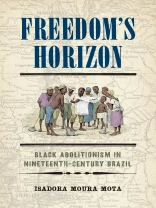A social and transnational history of black abolitionism in Brazil
Freedom’s Horizon is a transnational history of black abolitionism in Brazil. In the last country to abolish slavery in the Western Hemisphere, enslaved and free Africans and their descendants crafted their visions of liberation by thinking comparatively about the uneven spread of abolition across the Atlantic world. Between the 1840s and 1860s, they acted on the idea that the end of slavery anywhere placed freedom on the horizon in Brazil. Thus, they pursued alliances with British diplomats; rose in arms at the sight of both Union and Confederate warships off Brazil’s Atlantic coast; sought free soil at foreign consulates, on ships, and in maroon settlements (called quilombos); and organized uprisings for immediate abolition after learning of international emancipation struggles in the newspapers.
Isadora Moura Mota shows that through flight, marronage, rebellion, and literacy practices, enslaved and freed peoples in Brazil developed a geopolitical imagination in dialogue with the British campaign against the slave trade (banned in Brazil in 1850), French antislavery, the Haitian Revolution, the US Civil War, and the Triple Alliance War (1865–1870) in South America. Traditionally, historical research has focused on the 1870s and 1880s, when abolition emerged as Brazil’s first national mass political movement, ultimately leading to the outlawing of slavery in 1888. By turning attention to earlier decades and to the role of literacy in the associational lives of afro-Brazilians, Freedom’s Horizon reveals that abolitionism was more than just the cause of North Atlantic reformers, Latin American modernizing elites, or middle-class advocates. It was a grassroots movement that originated in the social and conceptual worlds of the enslaved and connected to a hemispheric black radical tradition.
Об авторе
Isadora Moura Mota is Assistant Professor of History at Princeton University.












